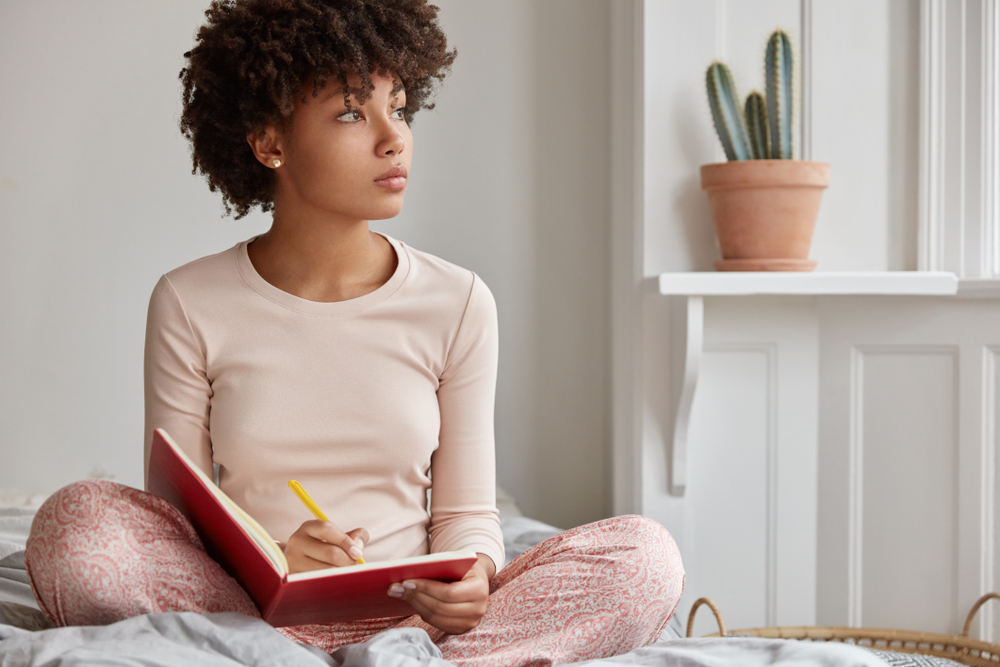It’s time to start thinking about the New Year and new beginnings. This year take time to focus on improving your mental health. Mental health has historically been brushed under the rug and not talked about. Thankfully, the conversation about mental health has started and it’s getting the attention it needs. The CDC reports that 10.1-percent of people who have gone to the emergency department have depression, just one of the many possible mental health conditions, listed on their medical record.
It’s easy to keep pushing through tough times waiting for life to get easier. But when you start focusing on yourself and your needs change can happen. Since your mental health is physically invisible it can be easy to ignore. Let’s stop ignoring it and use the New Year to make a resolution to improve it.
1. Long Term Solutions Not Short Term Goals
Your New Year’s resolution should be one (or more) that you can keep for the long run. To keep your resolution moving forward it needs to become a habit. So to start off your resolutions right you need to come to terms that this change will take time. There is no magic number for how long it’ll take you to form a new habit. Some sources report as few as 21 days while others report over a year.
Consistent positive behavior over time will develop your new resolution into a habit. Work on being purposeful with your changes and don’t overextend yourself. It can be easy to give up after a short amount of time so finding accountability is helpful. This can be with a friend, family member, or perhaps even better with a therapist. Anyone that can guide you to your resolution in a healthy, positive way is a great choice.
2. Surround Yourself with Positivity
Placing value on the good in your life and surrounding yourself with positive people can do wonders for both your mental and physical health. The positive energy from others can be infectious. You’ll feel happier and experience less stress. Stress causes inflammation within the body, this is known to contribute to multiple conditions like heart disease.
There is even research to support the benefits of optimistic thinking. HuffPost reported that, “a 30-year study of 447 people at the Mayo Clinic found that optimists had around a 50-percent lower risk of early death than pessimists. The study’s conclusion? “[M]ind and body are linked and attitude has an impact on the final outcome — death.” So keep the positive people in your life and you may even live longer!
3. Reduce Processed Foods
Cutting down on the amount of processed food you consume is a change both your brain and body will appreciate. Some studies have shown a link between your mental health and diet. A study reported by NPR is summarized by saying, “there’s fresh evidence that eating a healthy diet, one that includes plenty of fruits and vegetables and limits highly processed foods, can help reduce symptoms of depression.”
Removing all processed foods can be difficult so start slowly. Decide on one or two items to cut out at a time, while adding in more vegetables and fruit. Nutrient dense foods like green leafy vegetables will nourish your body while supporting your brain. This New Year’s resolution will be one that your whole body will thank you for!
4. Move Your Body
Exercise is probably the most common New Year’s resolution. It’s daunting and uncomfortable. But it doesn’t have to be. You don’t need to run a marathon, just move your body for 30 minutes a day. Do what you can, go for a walk or find a local yoga studio. Whatever it is your mental health will thank you.
Most people know that exercise is a great way to manage stress and combat depression. It releases endorphins helping you feel good well after the workout. Make this year the year that you commit to 30 minutes each day for your mental health.
5. Love Yourself
This year resolve to love yourself where you are right now. Finding happiness in the now and not the future is difficult yet incredibly important to your mental health. Believing that you will be happier after you lose weight or find love does not make you happier in the long run. According to Joel L. Young MD from Psychology Today, “indeed, believing that it does can be an impediment to happiness in the here and now, particularly if you fail to meet your goals month after month, year after year.”
Love yourself, your whole self. You deserve happiness for the person you are now. Changing yourself for the sake of other’s opinions is a disservice to yourself and your health.
6. Sleep
Some people are night owls and stay up late while others go to bed early enough but just can’t get a restful night’s sleep. Whatever your sleep problem is, this is the year to find a solution to your problem. Not sleeping enough has been linked to repetitive negative thinking. So both your mind and body are suffering from the lack of sleep.
Many people find that a sleep routine helps them fall asleep faster and remain asleep throughout the night. A relaxing bath, gentle yoga, or just listening to music before bed can help you unwind from a busy day. Play around with different routines until you find the one that works for you.
7. Journal
Journaling can be a therapeutic way to release thoughts and emotions. Unlike keeping a diary, which is an account of your day, journaling is a reflection of how you felt during the day or week. It’s a way to work through your emotional struggles and gives you mental transparency with hopes that you can find solutions to your struggles.
It can be hard to get started with journaling if you’ve never done it before. The words won’t easily flow and you might feel self-conscious. Be kind and gentle to yourself. With practice, you will feel more comfortable journaling and the emotions will move through you onto the paper.
8. Practice Gratitude
Practicing gratitude is a simple tool that can play a large role in your mental health. According to Psychology Today, “gratitude reduces a multitude of toxic emotions, from envy and resentment to frustration and regret…research confirms that gratitude effectively increases happiness and reduces depression.”
To practice gratitude, you can make a point to be thankful to those around you. Send notes to friends, family, and co-workers. Or incorporate gratitude into your journaling. Do this by taking time each day to write down what you are grateful for. Your choices don’t need to be complex or overly thought out, perhaps you are grateful for a warm, sunny day. What and how you choose to express your gratitude is up to you.
9. Focus on YOU
There is never enough time to do everything that needs to get done each day and have time for yourself. Carving out a little time each day for self-care can do wonders for your mental health. It’s so easy to push your needs out of the way to make time for everyone else. That’s why making self-care a New Year’s resolution will force a change in priorities to benefit you.
Self-care can come in many forms. It can be exercise, reading a book, or a new skincare routine. Whatever it is, block off a little time each day for you. If you need to, set your alarm 10 minutes earlier to make it happen. Over time, you’ll love this dedicated moment to yourself.
10. Meditate
Mediation is a purposeful practice of self-awareness and thought. It has proven mental health benefits. Fitness Magazine reports, “people felt less stressed when they meditated for 25 minutes a day for three days…” Meditation doesn’t require any extra tools and can be practiced just about anywhere. Making it an easy New Year’s resolution for just about anyone.
Combine meditation with a few other ideas on this list for an even greater mental health boost. This is the year to focus on your needs and mediation is a simple place to start.
11. Realign Your Priorities
This is a hard one but so crucial to your mental health. When you have a new stressor that is entering your life, whether it’s a new project for work, kids who refuse to listen, or a strained relationship think about if this situation will matter in two years. If not, let the stress go and refocus your mind onto something that truly needs your attention.
So many things in your life take up significant mental energy. When you can filter out the stressors that won’t have a long term impact you’ll have fewer burdens and more clarity. Start realigning your priorities this year to improve your mental health.
12. Reduce Social Media Exposure
Social media has changed the way we think, live, and behave. Nothing happens without being documented on a social media platform. However, oddly enough with all this connectedness, we have become less personal. Consuming too much social media is associated with depression, anxiety, and overall less personal satisfaction.
It’s time to officially limit the amount of time you spend on social media. You know that the people you follow are only posting their highlights. It’s not reflective of their actual day to day life. Make a resolution this year to cut back on social media and increase face to face time with family and friends.















